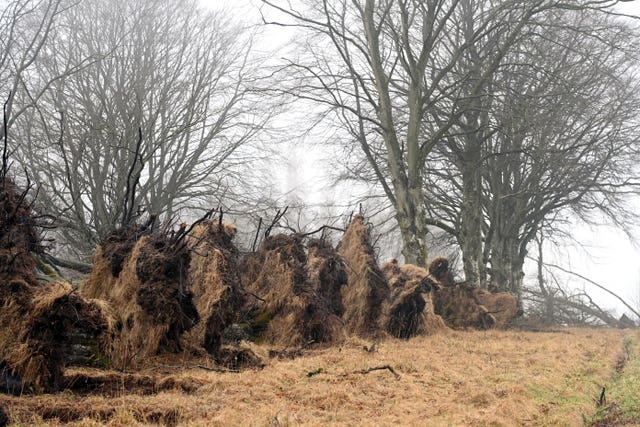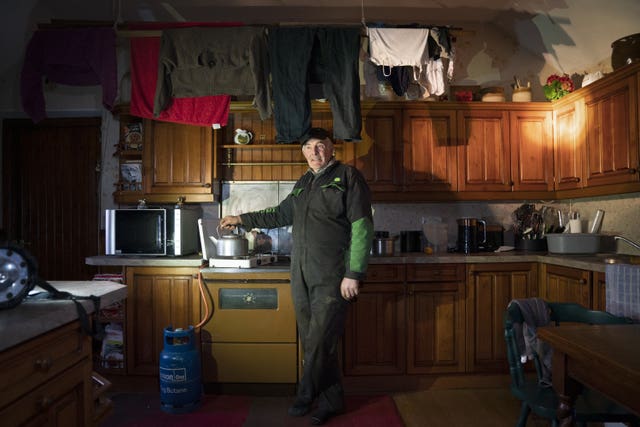
Nick Ferrari 7am - 10am
9 June 2022, 11:44

A critical report by the industry regulator has found some customers received ‘unacceptable service’ after the devastating storm in November.
Electricity firms need to “up their game” following a critical report into the response to Storm Arwen, which left almost a million homes without power, the industry regulator has said.
Winds of 100mph uprooted 16 million trees and damaged power lines, cutting the electricity supply from November 26 last year across northern England and Scotland.
The watchdog Ofgem has released the findings of a six-month review and said some customers received “unacceptable service”, with some cut off for more than a week, poor communication about when they would be reconnected and slow compensation payments.
Three network operators – Northern Powergrid, Scottish and Southern Electricity Networks and Electricity North West – have paid nearly £30 million in compensation and agreed to pay another £10.3 million in “redress payments” to local communities.
While acknowledging that engineers, supported by the Army, worked very hard in challenging conditions, Ofgem chief executive Jonathan Brearley said: “It was unacceptable that nearly 4,000 homes in parts of England and Scotland were off power for over a week, often without accurate information as to when power would be restored.”
And speaking on BBC Radio 4’s Today programme, he said: “The main message to all the network companies is ‘up your game’, get ready for winter.
“This is a really tough time for customers right now; this is a market where everybody is having a difficult time.
“Every energy company that’s working in this country needs to be working on behalf of their customers and that means big changes for the networks.”
Stewart Sexton and his partner Jane, from Alnwick, Northumberland, were left without power and hot water for almost 11 days after a telegraph pole in their village snapped on November 26.
The 58-year-old said he would ring Northern Powergrid “most days” and was repeatedly told his power would be restored “by midnight” that evening or “by tomorrow morning”.
“By 3.30pm it was too dark inside the house to see, so it was just 16 hours of pitch darkness with no heating in winter, without any contact and just false information from the provider on a daily basis,” Mr Sexton told the PA news agency.

“If somebody had said to you ‘it’s a disaster, your power’s going to be off for a week’, people may well have then gone out and bought generators.
“I’m not surprised by (the Ofgem findings) at all… it was absolutely, totally unacceptable.”
Mr Sexton received compensation after the power outage but said the money “did not compensate” for his experience and the communication from Northern Powergrid.
The Ofgem review found:
– Some affected customers remained off power for an unacceptable amount of time, received poor communication from their network operator and compensation payments took too long.
– Plans in place to deal with the storm were not sufficient to deal with the scale of the damage.
– Northern Powergrid did not directly contact vulnerable customers enrolled on its Priority Services Register prior to Storm Arwen, which should have been carried out as part of its winter preparedness campaign.

– The same firm accepted the performance of its call centre fell below the standards it should have been able to meet during a severe storm, potentially breaching its licence.
– Limited remote monitoring stopped firms from understanding the full scale and complexity of faults.
– There was some correlation between the age of electricity poles and how badly damaged they were in the storm, although this needed further examination.
Ofgem has recommended firms should submit their winter plans to the regulator so it is sure they are prepared.
They should also stress-test their websites and call centres to ensure adequate capacity during severe weather events.
Firms should also develop systems to speed up mass compensation payments.

Business and Energy Secretary Kwasi Kwarteng said: “This action plan will ensure better preparedness for future storms, boosting the security of our electricity system and protecting families.”
David Smith, chief executive of the Energy Networks Association, which represents the UK and Ireland’s energy networks businesses, said firms have planned improvements.
He said: “This is particularly important as severe weather events become more frequent.
“The six electricity distribution network operators have submitted these details in their business plans for the next five years and Ofgem is due to make its initial determination in the coming weeks.”